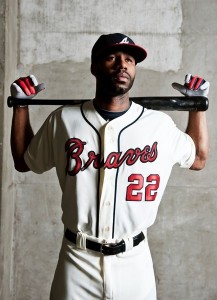By Barbara Greene
Making good adjustments in sports often is the difference between a fist pump as you run the bases or a head hanging low in frustration on the walk back to the dugout.

Every player makes adjustments at the plate, but few understand why sometimes the adjustment works and sometimes they don’t. The ability to make good adjustments comes from two sources: physical and mental. On the physical side, your ability to make good adjustments comes from years of practicing solid skills to perfect swing mechanics. On the mental side, you must be able to transition from the frustration of not connecting, and refocus your mind on the fundamentals of good swing mechanics.
While it sounds simple, players often have a hard time focusing through the frustration, which clouds their attempts to make the right adjustments.
Almost every player is able to make good adjustments during batting practice, but get completely baffled during a game. Games bring the added element of pressure that’s a literal game changer. The pressure magnifies with each game situation that can ratchet up the intensity.
Consider a player who is at the plate in bottom of the ninth with two men on, two outs, two strikes and his team trailing by one run. He might be thinking about all those factors, which raises his anxiety level to a point where it negatively impacts his performance.
Pressure and anxiety can bog down every player. The bigger the game, the bigger the pressure. Sometimes a bad play defensively can stick with you and impact your performance at the plate, which causes frustration that results in a cyclical cycle during a game, series or season.
Life stressors can follow you onto the field and take you out of your game. In the movie, “For the Love of the Game,” Kevin Costner plays a MLB pitcher in what may be his last season. He feels the pressure to perform to stay in a sport he loves. He has issues as he returns from an injury that still impacts his ability to pitch.
Over his long career, he has been able to achieve success by focusing during intense game situations by taking a deep breath and saying, “Clear the mechanism.” The mental adjustments help him erase all the “noise and distractions” that are clouding his mind, allowing him to focus solely on his skills. This mental skill mutes the noise, and sharpens and narrows his focus on delivering the right pitch to the plate.
The ability to make a good physical adjustment doesn’t come without being able to first make a mental adjustment and focus on the task at hand. In helping athletes who play baseball and softball grow mentally stronger using sport psychology, this is a big area of the work we do. Players spend hours, days, months and years focusing on the physical skills in the sport.
Spending a little time working on the mental side of the sport can pay off each time you come to the plate. If you aren’t mentally ready, you’re just making physical adjustments and hoping to get a hit. Players who are mentally focused are much more likely to make the right adjustments to get the hit.
BIO:
Barbara Greene is a sport performance consultant with Pure Performance Inc. She can be reached at 404-729-6326 or via email at BarbaraAGreene@aol.com. Follow her on twitter @BGreene1

Leave a Reply